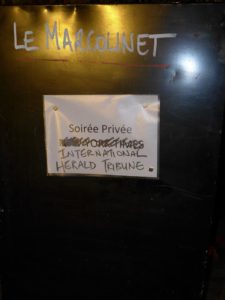It was the last official act of the American-owned newspaper that had been published in Paris since 1887.
A party.
A month ago, the Paris newsroom was all-but shuttered and most of the remaining staff was laid off at what had been known, going back 129 years, as the Paris Herald, the Paris Herald Tribune, the International Herald Tribune (from 1967 to 2013) and, finally, the International New York Times.
NYT decided it did not need/could not afford what was a standalone newsroom in Paris, and now it is gone.
Some of the IHT staff, most of them left without jobs, met with IHT alumni, some of whom traveled to be in Paris on a crisp Friday night, on a small boat tied to the quay on the right bank of the Seine, to catch up with everyone and talk a bit about the old days, and what happens next.
Subsequent years may see more get-togethers, but this was the last event that had any imprint of the New York Times International Edition (as the IHT was known at the end). NYT apparently put up 2,000 euros toward the farewell soiree.
One might have thought the event would be sad and blue, but it was more like an Irish wake — with lots of hugs and bizous, more than a few bottles of wine/Champagne.
Everyone was asked to bring one bottle — two if they were bringing a plus-one — in addition to paying 25 euros for what the Brits call “nibbles”.
The IHT alumni took over the whole of the boat named Peniche la Marcounet, which normally is a floating bar with live music, and the crowd of 55 pretty much filled the place.
It started at 8 and the former staffers closed it down at 1 a.m., staggering into the night, much as they might have done after putting the newspaper to bed, those 129 years.
It was a fine newspaper, beloved by generations of traveling Americans and even more appreciated by the Yanks who staffed the place.
It was easily the most romantic notion in American journalism — a newspaper produced in Paris by Yanks who made a living in their chosen profession while living in one of the world’s great cities.
The IHT was a sort of hybrid that for more than a century tread a line between being a European newspaper produced by Yanks and being an American newspaper that happened to circulate in Europe.
The IHT had fans in capitals of Europe, where it was seen as an expression of informed American opinion, as well as the backpackers from the states making the grand tour with the IHT folded up in their rucksacks.
I am proud to say that I worked for the IHT for seven months (most of a year!) in two loan stints — three months in Paris in 2001, four months in the Hong Kong bureau in 2008-09.
It was an editor’s newspaper. The IHT never had many of its own reporters. For most of its modern history, it could cherry-pick news stories and opinion pieces from the New York Times and Washington Post, who co-owned the newspaper for four decades.
After picking out a story lineup, IHT editors got busy doing “value-added editing”, as one copy desk chief called it.
Any mildly observant American traveler over the previous 50 years would have been well aware of the IHT, which pretty much was the only media outlet available in Europe and, eventually much of the world, that on a daily basis put out an American-style newspaper, in English.
It also had several small features that many buyers of the paper found comforting or important, especially while abroad in a pre-internet world — a crossword puzzle, a half-dozen comic strips, most major sports scores from America and a stocks page.
Staffers who were at the paper most of a lifetime ago attended the party, as did some who had been around mostly in the final years, when NYT slowly asserted its hegemony and then decided the IHT was not worth keeping.
“What are you doing now?” was the question of the evening. Most of the newspaper people are unemployed (for the first time, in many cases) and are weighing their options.
Some concede they feel more French than American now and have no plans to return to the states. Others are investigating new careers — in restaurants, in schools, in public relations, in the few newspaper jobs that come up — by taking advantage of retraining programs offered by the French government. Some will go home, eventually.
A few remarks were made, and those who knew the typographers song (a French union hymn to workplace solidarity and drinking, which seemed appropriate) sang along.
Then everyone got back to drinking. Eventually, some got around to dancing, and then everyone was bundled out into the night, the most romantic newspaper in English-language newspapering finally committed to history.


0 responses so far ↓
There are no comments yet...Kick things off by filling out the form below.
Leave a Comment